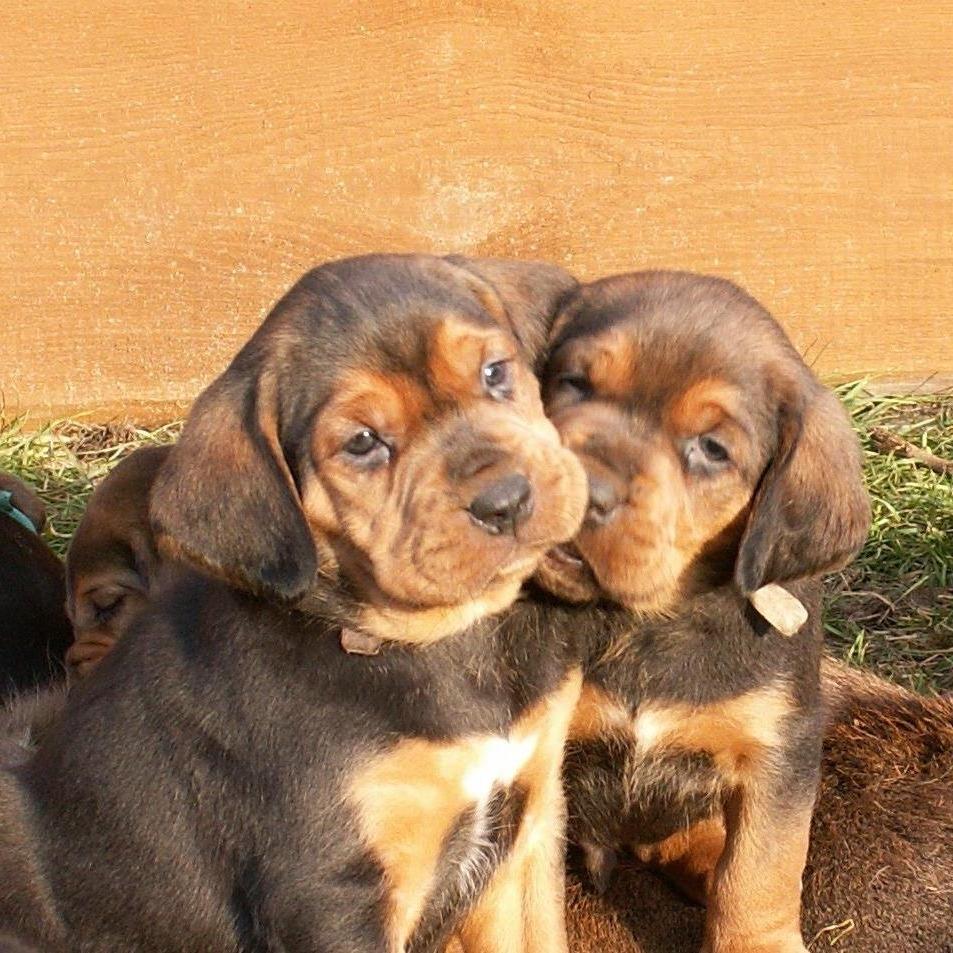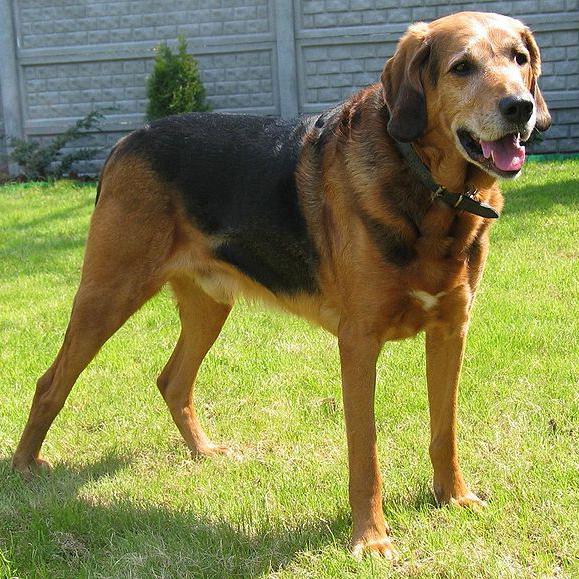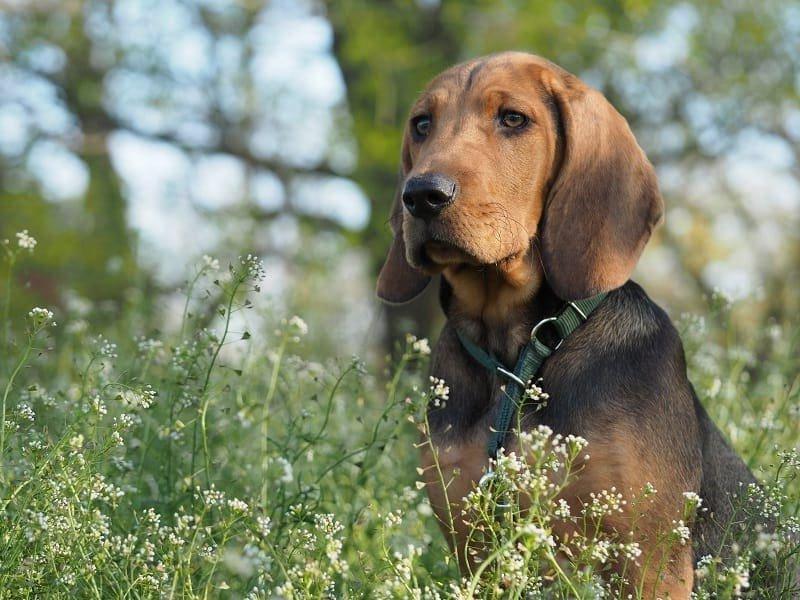- Breed Category: Hound
- Country of Origin: Poland
- Average Height: Males 55-65 cm, Females 50-60 cm
- Average Weight: Males 25-32 kg, Females 20-26 kg
- Average Life Span: 12-14 years
- Grooming Requirements: Low, occasional brushing
- Exercise Requirements: High, needs daily exercise
- Coat Type: Short and dense
- Coat Color Variations: Black and tan
- Shedding Level: Moderate
- Ear Type: Long and floppy
- Tail Type: Long and straight
- Temperament: Loyal, intelligent, and gentle
- Intelligence Level: High
- Barking Tendency: Moderate
- Compatibility with Children: Good with proper socialisation
- Compatibility with Other Pets: Generally good with other dogs
- Training Ease: Moderate, requires consistency
- Common Health Issues: Hip dysplasia, ear infections
- Dietary Needs: High-quality dog food recommended
- Energy Level: High
- Drooling Tendency: Low
- Sensitivity to Weather: Tolerates cold better than heat
- Overall Maintenance Level: Moderate
- Original Purpose: Hunting and tracking
- Year of Recognition by Kennel Clubs: 1966
- Apartment Friendly: Not ideal, needs space
- Best Suited For: Active families, rural settings
- Cost of Ownership: Moderate
- Unique Traits: Excellent scent tracking ability
Imagine a dog that combines the loyalty of a Labrador with the keen hunting instincts of a Beagle. That’s the Polish Hound for you. Known for its exceptional tracking abilities, this breed is a hidden gem among hunting dogs. This article aims to shed light on the Polish Hound’s unique characteristics, rich history, and essential care tips.
The Polish Hound, or Ogar Polski, has roots that trace back to the 13th century. Originating in Poland, it was bred for hunting in the dense forests of Eastern Europe. Over the centuries, it has evolved into a versatile and resilient breed, prized for its endurance and intelligence. Understanding its history helps appreciate the breed’s remarkable traits and needs.
Early Development and Role in Polish Hunting Traditions

The Polish Hound’s journey began in the heart of Poland, where it was meticulously developed to meet the demands of local hunters. This breed was crafted to excel in the challenging terrains of Eastern Europe, where dense forests and varied wildlife required a dog with both stamina and a sharp nose. The Polish Hound quickly became a staple in hunting traditions, known for its ability to track game over long distances.
Key Historical Figures
Several key figures played a role in shaping the Polish Hound. Notably, Polish nobility and hunters were instrumental in refining the breed’s characteristics. They sought a dog that could not only track but also work tirelessly alongside hunters, making the Polish Hound an invaluable companion in the field.
Physical Characteristics
Physically, the Polish Hound is a robust and athletic dog. It boasts a strong, muscular build, with a coat that is typically short and dense, providing protection against harsh weather. Its expressive eyes and long ears give it a distinctive appearance, while its powerful legs and deep chest hint at its endurance and agility. This breed is not just about looks; it’s built for performance.
Appearance and Unique Traits

The Polish Hound is a medium to large-sized dog, standing tall with a commanding presence. Its coat is typically a rich, dark brown or black, often accented with tan markings that add to its striking look. These distinctive markings, especially around the face and legs, make it easily recognisable. The coat is short and dense, perfect for withstanding the elements during long hunts.
One of the standout features of the Polish Hound is its athletic build. This breed is all about strength and endurance, with a muscular frame that supports its active lifestyle. Its long ears and soulful eyes not only add to its charm but also enhance its sensory capabilities, crucial for tracking scents over vast distances.
Temperament and Behaviour
When it comes to temperament, the Polish Hound is known for its calm and composed nature. It’s a breed that thrives on companionship and is incredibly loyal to its family. While it has a strong hunting instinct, it’s also gentle and patient, making it a great fit for families. This dog is intelligent and eager to please, which makes training a rewarding experience. However, it does require regular exercise to keep its mind and body engaged.
Personality and Suitability

The Polish Hound is a loyal and intelligent breed, making it a fantastic family pet and hunting companion. Its loyalty is unmatched, always eager to be by your side, whether at home or in the field. This dog is not just smart; it’s quick to learn and thrives on mental challenges, which makes training a breeze. Its energy level is moderate, so while it enjoys a good run, it’s also content with a relaxed day at home.
Interaction with Children and Other Animals
With children, the Polish Hound is gentle and patient, making it a wonderful playmate. It understands the dynamics of a family and adapts well to the presence of kids. When it comes to other animals, this breed is generally sociable, though early socialisation is key to ensuring harmonious interactions. Its hunting instincts are strong, so supervision around smaller pets is advisable.
Training and Exercise Needs
Training a Polish Hound is a rewarding experience due to its eagerness to please and intelligence. Consistent, positive reinforcement works best. Regular exercise is essential to keep this breed happy and healthy. Daily walks, playtime, and mental stimulation are crucial to meet its needs. This ensures a well-balanced dog that fits seamlessly into family life.
Training, Exercise, and Health

Importance of Early Training and Socialisation
Getting your Polish Hound started with training and socialisation early on is crucial. This breed is intelligent and eager to learn, so introducing them to different environments, people, and other animals helps shape a well-rounded dog. Early exposure ensures they grow up to be confident and adaptable, making them a joy to have around.
Recommended Training Techniques
When it comes to training, positive reinforcement is the way to go. This breed responds well to rewards and praise, so keep sessions fun and engaging. Consistency is key, and short, frequent training sessions work best to keep their attention. Remember, patience and persistence will pay off.
Daily Exercise Requirements and Activities They Enjoy
The Polish Hound is an active breed that thrives on regular exercise. Daily walks are a must, but they also love activities like hiking or playing fetch. Mental stimulation is just as important, so puzzle toys and scent games can keep their minds sharp. A well-exercised Polish Hound is a happy one.
Health and Lifespan
Generally, Polish Hounds are healthy dogs with a lifespan of around 12 to 14 years. Regular vet check-ups and a balanced diet are essential to keep them in top shape. Like any breed, they can be prone to certain health issues, so staying informed and proactive about their health is important.
Health and Care for the Polish Hound
Common Health Issues
Polish Hounds are generally robust, but like any breed, they can face certain health challenges. Hip dysplasia and ear infections are among the more common issues. Regular vet visits can help catch these early, ensuring your hound stays in top form.
Average Lifespan and Health Tips
With proper care, Polish Hounds typically live between 12 to 14 years. To keep them healthy, a balanced diet and regular exercise are key. Don’t forget mental stimulation; these dogs love a good puzzle or scent game.
Preventative Care Recommendations
Preventative care is crucial. Regular vaccinations, flea and tick prevention, and dental care should be part of your routine. Keep an eye on their ears, especially if they love a good swim, to prevent infections.
Grooming and Maintenance
Grooming a Polish Hound is pretty straightforward. Their short, dense coat requires weekly brushing to keep it looking its best. Regular nail trims and ear checks will also help maintain their overall health and comfort.
Coat Care and Grooming Routines
The Polish Hound’s coat is short and dense, making grooming a breeze. A weekly brush is usually enough to keep it looking sleek and healthy. This not only removes loose hair but also helps distribute natural oils, keeping the coat shiny. During shedding seasons, you might need to brush more frequently to manage the extra hair. A good quality bristle brush or grooming mitt works wonders.
Shedding and Seasonal Grooming Tips
Like many breeds, the Polish Hound sheds more during spring and autumn. During these times, increase brushing sessions to a few times a week. This helps minimise hair around the house and keeps your hound comfortable. Bathing is only necessary when they get particularly dirty, as over-bathing can strip essential oils from their coat.
Diet and Nutrition
A balanced diet is crucial for the Polish Hound’s health and vitality. High-quality dog food, rich in protein and essential nutrients, supports their active lifestyle. Portion control is important to prevent obesity, which can lead to health issues. Fresh water should always be available, and occasional treats can be used for training and rewards. Consult your vet for specific dietary needs, especially if your hound has any health concerns.
Nutritional Needs for Optimal Health

Foods to Include and Avoid
For a Polish Hound, a diet rich in high-quality protein is essential. Look for dog food that lists meat as the first ingredient. Omega-3 and Omega-6 fatty acids are also beneficial for maintaining a healthy coat and skin. Avoid foods with artificial additives, fillers, and excessive grains, as these can lead to allergies and digestive issues.
Feeding Schedules and Portion Recommendations
Establishing a consistent feeding schedule is key. Typically, two meals a day work well for adult Polish Hounds. Puppies may require more frequent, smaller meals to support their growth. Portion sizes depend on the dog’s age, weight, and activity level, so it’s wise to consult your vet for tailored advice. Always ensure fresh water is available.
Fun Facts and Trivia
Did you know the Polish Hound’s keen sense of smell is so sharp that it can track scents over several kilometres? This makes them exceptional hunting companions. Another fun fact: their long ears aren’t just for show; they help funnel scents towards their nose, enhancing their tracking abilities.
Interesting Tidbits and Famous Polish Hounds

The Polish Hound, or Ogar Polski, is not just a skilled hunter but also a breed with some fascinating quirks. For instance, their long ears aren’t just for show; they actually help funnel scents towards their nose, enhancing their already impressive tracking abilities. This makes them exceptional at following trails, even over long distances.
In terms of fame, while the Polish Hound might not be a household name in the media, it has a rich history in Poland. These dogs were often companions to Polish nobility during hunting expeditions, showcasing their status and utility. Their reputation as reliable hunting partners has been well-documented in various historical texts, highlighting their importance in Polish culture.
Despite their historical significance, the Polish Hound remains a bit of a hidden gem outside of Poland. However, their unique traits and loyal nature make them a breed worth discovering for those interested in a versatile and devoted canine companion.
Final Thoughts

The Polish Hound is a loyal and versatile companion. Its rich history and exceptional tracking abilities make it a standout among hunting breeds. Balancing its high energy and intelligence with proper care and training can lead to a rewarding relationship. Embrace the unique traits of this breed to enhance your family’s dynamic and outdoor adventures. Consider welcoming a Polish Hound into your life for a devoted and active partnership.
